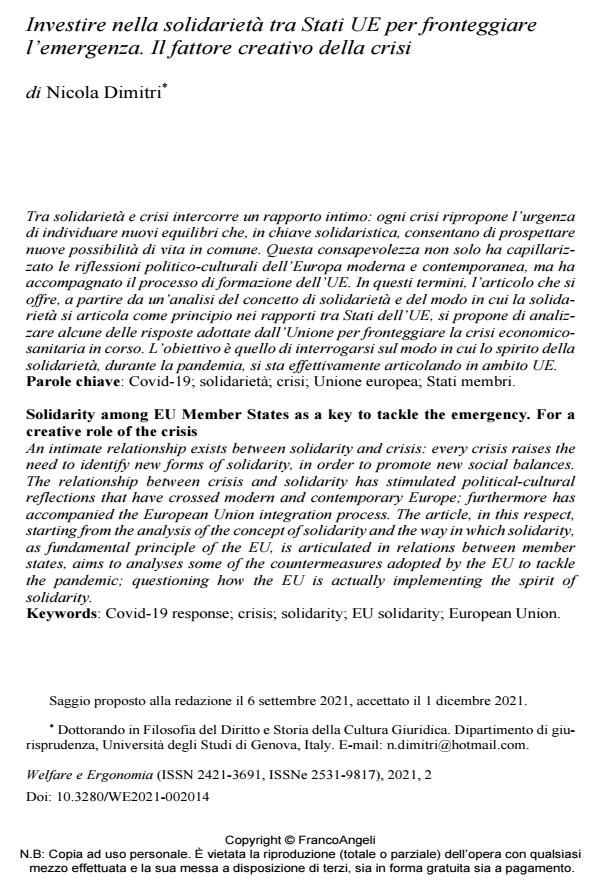Solidarity among EU Member States as a key to tackle the emergency. For a creative role of the crisis
Journal title WELFARE E ERGONOMIA
Author/s Nicola Dimitri
Publishing Year 2022 Issue 2021/2
Language Italian Pages 10 P. 171-180 File size 168 KB
DOI 10.3280/WE2021-002014
DOI is like a bar code for intellectual property: to have more infomation
click here
Below, you can see the article first page
If you want to buy this article in PDF format, you can do it, following the instructions to buy download credits

FrancoAngeli is member of Publishers International Linking Association, Inc (PILA), a not-for-profit association which run the CrossRef service enabling links to and from online scholarly content.
An intimate relationship exists between solidarity and crisis: every crisis raises the need to identify new forms of solidarity, in order to promote new social balances. The relationship between crisis and solidarity has stimulated political-cultural reflections that have crossed modern and contemporary Europe; furthermore has accompanied the European Union integration process. The article, in this respect, starting from the analysis of the concept of solidarity and the way in which solidarity, as fundamental principle of the EU, is articulated in relations between member states, aims to analyses some of the countermeasures adopted by the EU to tackle the pandemic; questioning how the EU is actually implementing the spirit of solidarity.
Keywords: Covid-19 response; crisis; solidarity; EU solidarity; European Union.
- Bourgeois L. (2010). L’ordine della solidarietà. Rapporto di Léon Bourgeois al Congresso d’Educazione Sociale nel 1900. Scienza & Politica. Per Una Storia Delle Dottrine, 20(38).
- Burelli C. (2018). Solidarity, Stability and Enlightened Self-Interest in the EU. Politiche Sociali, 3: pp. 449-464. DOI: 10.7389/91923
- Chiarella P. (2017). Società a solidarietà limitata. Lo Stato sociale in Europa. Politica del Diritto, 4: 689-716.
- Contaldi G. (2020). Le misure poste in essere dall’Unione Europea per affrontare la crisi economica generata dalla pandemia Covid-19. In: Calzolaio E., Meccarelli M. e Pollastrelli S., a cura di, Il diritto nella pandemia. Temi, problemi, domande. Macerata: EUM, pp. 221-234.
- Guazzarotti A. (2019). Poteri, diritti e sistema finanziario tra centro e periferia. Rivista AIC, 3: 290-309.
- Habermas J. (2014). Nella spirale tecnocratica. Un’arringa per la solidarietà europea. Roma-Bari: Laterza.
- Habermas J. e Streeck W. (2020). Oltre l’austerità. Disputa sull’Europa. Roma: Castelvecchi Editore.
- Lo Giudice A. (2011). Istituire il Postnazionale. Identità europea e legittimazione. Torino: Giappichelli.
- Manzini P. (2017). La solidarietà tra Stati membri della Unione europea: un panorama ‘costituzionale’. In: Di Miriam A. e Bassan F., a cura di, Éthique globale, bonne gouvernance et droit international économique. Torino: Giappichelli, pp. 138-154.
- Monnet J. (1976). Mémoires. Paris: Fayard.
- Mostacci E. (2020). La terza onda. L’Unione europea di fronte alle conseguenze economiche della pandemia. DPCE online, 2: 2369-2391.
- Offe C. (2014). L’Europa in trappola. Riuscirà l’Ue a superare la crisi? Bologna: il Mulino.
- Resta E. (2008). Diritto vivente. Roma-Bari: Laterza.
- Rodotà S. (2016). Solidarietà. Un’utopia necessaria. Roma-Bari: Laterza.
- Rosanò A. (2020). Le conseguenze economiche del Coronavirus e la battaglia sul quadro finanziario pluriennale 2021-2027: alla ricerca di un principio di solidarietà europea. Federalismi, 24.
- Salvati M. (1993). Solidarietà: una scheda storica. Parole Chiave, 2. Fondazione Basso.
- Schmale W. (2017). European solidarity: a semantic history. The Bonds That Unite? Historical Perspectives on European Solidarity / Les liens qui unissent? Perspectives historiques sur la solidarité européenne, European Review of History, 6: 854-873.
- Somma A. (2021). Quando l’Europa tradì se stessa. E come continua a tradirsi nonostante la pandemia. Roma-Bari: Laterza.
- Zweig S. (1946). Il mondo di ieri. Milano: Mondadori.
- Visioni di Europa e fiducia nella scienza della comunità studentesca italiana Valentina Tudisca, Nicolò Marchesini, Adriana Valente, in WELFARE E ERGONOMIA 2/2024 pp.173
DOI: 10.3280/WE2023-002012 - Giovanni Berlinguer: l'analisi scientifica al servizio della politica sociale Antonella Ciocia, Mara Tognetti, in WELFARE E ERGONOMIA 1/2022 pp.7
DOI: 10.3280/WE2022-001001
Nicola Dimitri, Investire nella solidarietà tra Stati UE per fronteggiare l’emergenza. Il fattore creativo della crisi in "WELFARE E ERGONOMIA" 2/2021, pp 171-180, DOI: 10.3280/WE2021-002014